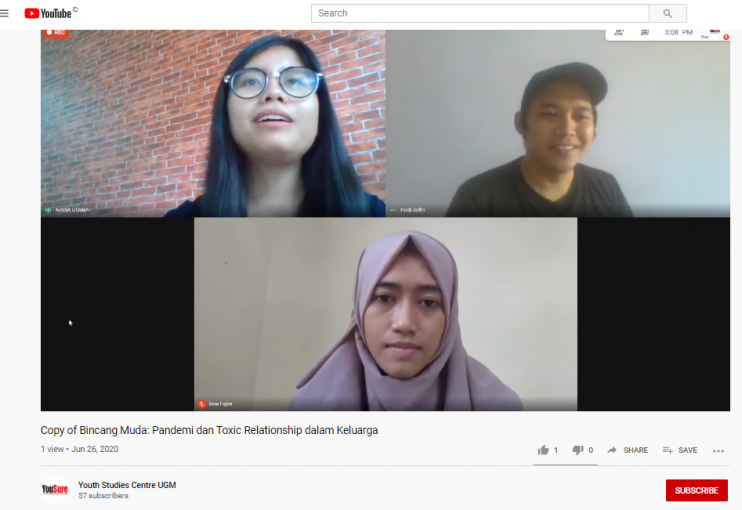
Yogyakarta, 27 June 2020—Youth Studies Centre (YouSure) FISIPOL UGM invited Isna Nur Fajria from the Department of Government and Political Sciences UGM and Ferdi Arifin from IMAOS ID as speakers in the Bincang Muda forum (26/06). IMAOS ID is a media which provides references on parenting and family financial management from scientific sources like books and journals. Both speakers discuss family relations amidst the pandemic, particularly newlyweds.
The COVID-19 pandemic obliged the people to limit physical interaction and spend time at home. Such confinement might affect ourselves and people in our surroundings, notably our family. The boredom and discomfort might spark conflicts and establish unhealthy relationships.
Isna, entering her ninth semester of university, got married in January. As a newlywed, Isna and her husband admitted that COVID-19 did influence their relationship. Aside from the economic impact of the pandemic, quarantine affected them psychologically, as they felt dull seeing the same people continuously and had limited interaction with others. After communicating their problems to each other, they started to distance themselves. Mufid, the husband, went to mosque while Isna stayed home for a few hours. Isna affirmed that the method was effective in refreshing her mood.
Responding to Isna’s concerns, Ferdi agreed that boredom might impact family relationships negatively. Boredom tends to fuel anger, remarkably in situations of discomfort, i.e. when one’s job is disrupted. Such feeling might end up starting conflicts and establishing unhealthy relationship in the family, in result requiring distancing and alone time for oneself.
Moreover, the thick patriarchal values in Indonesia resulted in problems of role distribution. Husbands who are not used to house chores are often insensitive in terms of helping their wives based on their own initiatives. According to Ferdi, wives can be easily upset when husbands stay home all day without helping with the chores.
The main solution is to improve the quality of communication in the relationship. Husbands and wives are expected to open up to each other, express themselves, and exchange encouragements. Ferdi argues that the main challenge to young couples or newlyweds is one’s self-centric tendencies. When communication is well done and couples can understand each other’s hardships, a relationship will be well-maintained.
“Every family has their own means to maintain a harmonious relationship. There is no single approach in solving family problems,” Ferdi reckoned. Hence, families should take advantage of the pandemic should as a moment to spend more time with family and know each other better. Through a better understanding of partner’s traits, solution to problems in the relationship will be more easily discovered.
Isna and her husband agreed to the idea. Isna acknowledged that the pandemic allowed her and her husband to engage in joint activities and know each other better, i.e. by making donations, running a business, cooking, and creating Youtube content. They also think that it is easier to open up and be honest about their feelings, for instance when they’re tired, in need of help, etc. They also help each other finish house chores.
Despite spending a lot of time at home, balancing me time and family time is still necessary. A good communication should be developed, as a relationship is anything but egocentric. Putting one’s ego aside is expected to help avoid family conflict, as well as respect each other’s privacy.
